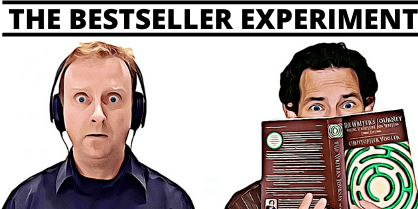EP05: NaNoWriMo | How to Write 50,000 Words in Month | Grant Faulkner

ABOUT GRANT:
PODCAST
Click to Tweet: “A goal and a deadline are your creative midwife,” Grant Faulkner @bestsellerxp @NaNoWriMo
Thanks for listening and joining us. Have some feedback you’d like to share? Leave a note in the comment section below.
SPREAD THE LOVE
If you enjoyed this episode, please share it using the social media buttons you see at the bottom of the post.
SUBSCRIBE, RATE & REVIEW ON ITUNES
Please do subscribe on iTunes and leave an honest review for The Bestseller Experiment podcast. Ratings and reviews are extremely helpful and greatly appreciated! They do matter in the rankings of the show, and we read each and every one of them. Don’t forget, when subscribing to the show on iTunes you will get automatic updates.
If you have any questions, you can contact us here.
EPISODE HIGHLIGHTS:
- NaNoWriMo : Website | Facebook | Twitter (@NaNoWriMo)
-
In this episode you will discover…That NaNoWriMo is a community: and you can be part of it.How it can benefit your writing: it’s not about critiquing, but more like a worldwide support group.Embrace the fear of the first draft: all the books we loved started as first drafts, and NaNoWriMo gives you permission to write that rough first draft.A goal and a deadline are a creative midwife: give yourself permission to do it!
- Scrivener – The Official Writing App of the Bestseller Experiment
- Co-Hosts:
Links featured in today’s show:
- Bestseller Experiment’s Vault of Gold. Sign up to get your free Writer’s ebook
- Question Mark: Have a question you want answered on the show? Click here.
EPISODE TRANSCRIPT (HIGHLIGHTS)
Grant Faulkner is the Executive Director of National Novel Writing Month – aka NaNoWriMo, co-founder of the lit journal 100 Word Story, co-founder of the Flash Fiction Collective, and a member of the Oakland Book Festival’s Literary Council. His collection of one hundred 100-word stories Fissures, was recently published and he’s just finished a novel, The Letters, and a collection of short stories, The Comfort Sin Provides.
We were very lucky to get to speak to Grant in the hectic run-up to NaNoWriMo, the annual event where writers pledge to write a 50,000-word novel in the month of November…
In the days leading up to NanoWriMo:
The Twittersphere is full of #nanowrimo, with people discussing their ways to get ready, or if they’re going to do it, or if they’re on the fence, and it’s just so exciting to see the whole world talk about novel writing. #nanowrimo trends on Twitter almost every day of the month in November. There’s a lot of excitement out there, there’s going to be a lot of new novels.
How NaNoWriMo began:
Most great things have an element of accident in them. What happened was, Chris Baty, the founder, way back in 1999, wanted to write a novel. He was an avid reader, and he woke up one day and said ‘How do you do this?’ He knew you could buy ‘How to write’ books, and he knew you could take writing workshops and all that, but he also understood the best way to learn a lot of things is just by doing them, and I think that really holds true to novel writing. ‘How to write’ books are great, workshops are great, but the best way to learn is to immerse yourself in the experience.
Chris recruited about twenty of his friends and they met in cafes every night to write together and they accidentally laid the foundations for the things we do today.
On the one hand we really believe in developing a writing community and writing with others, and we have a variety of ways to support that community, and one great benefit is that it builds accountability. If one of those twenty people didn’t show up at the cafe one night to write, then they got the question, ‘How’s your novel coming?’, ‘Why weren’t you here?’ With a group of people around you, like this, you’re more likely to succeed if that’s the case. They also developed really fun writing games, like pavlovian games, and they would challenge each other. They would say whoever can write the most in the next five minutes will win a latte. They’d all write with gusto and abandon and try to win the latte. And conversely they would say you can’t got to the bathroom till you’ve written a thousand words and, especially after that latte, that is the most motivating writing challenge on the planet.
They all wrote novels and they had fun writing them and they came back the next year and a hundred and fifty people joined them, word spread, and the year after that Chris started a rudimentary website, and five thousand people showed up to write, and then last year we had nearly five hundred thousand people in total, along with our young writers’ programme. We say that everyone has a story and everyone’s story matters and we see proof of that every year by the number of people who sign up.
What makes NaNoWriMo different to other writing communities:
We’re non-profit, but if the organisation went away, NaNoWriMo would still happen every year and that’s because the passionate writers would make it happen and they would carry it on. And it’s focused on encouragement. Everyone is legitimately rooting for the other writers around them to succeed. We’re not so focused on the end product, or critiquing, giving feedback or publishing, and the status of hierarchy that naturally comes from that. We’re interested in igniting people’s creative potential and that’s why so many people find their writing home with NaNoWriMo.
How it inspired Grant:
I didn’t even dream of writing a novel when I was at high school. I wrote short stories, but I didn’t hear about anyone of my age even attempting a novel. I wrote my first novel when I was in my mid- to late-twenties, which I thought was a perfectly good achievement. I’m so amazed; I’ll meet teenagers who’ve not only written one novel, but five or six or seven.
My daughter has done NaNoWriMo as well, and it’s so magnificent to go to one of our write-ins with her and actually write with her. We share this creative passion, and I hear these stories all the time about parents writing with their children.
What if someone is still on the fence about trying it this year?
I read a Tweet today where someone was saying ‘I’m deciding whether or not to do NaNoWriMo, but I’m just not quite feeling the vibe.’ I think that person was talking about inspiration, and I think all too often writers wait for inspiration to come to them, and almost every novel in history that’s been written has a spark of inspiration somewhere in there, but the way that it happens is not waiting for that inspiration. You create the inspiration every day you sit down to write. You have to show up and write and create that novel, and I guarantee you’ll find the inspiration in the words you write on the page and just by sitting down and doing it.
So many people stay on the fence year after year after year, no matter whether it’s writing a novel or chasing one of their other creative dreams, and I think there’s something to be said for just doing it. Jumping in. It’s free! You have absolutely nothing to lose. So many people say they want to write a novel ‘Some day’ and we help make that happen ‘today’. You have to view your creative projects with a sense of urgency, and make them happen otherwise you’ll be on the fence your whole life.
Too many people hold back from saying that they are a writer. It feels too precious, or you’re not a writer until you’re validated by publishing.
You’re a writer because you write:
And you have to show up and do it every day and that’s the way all books that we love have been created and that our premise if that all those great books, whether it was written by Tolstoy or Shakespeare or anybody they start out as rough drafts, they were not in the perfect form that we read them in, a lot of labour has gone into them, that’s why we essentially give people permission to write that rough draft. It’s not going to look like that novel that you love, but that’s not what it’s supposed to look like, it’s supposed to look like a rough draft.
A goal and a deadline are a creative midwife:
And I really think that metaphor is true. When you’re writing it’s really easy to fool yourself about how much you’re really progressing. You can be writing that novel for years and never get to that finish line and I know a lot of writers, and I’m certainly guilty of this myself from time to time, that I’ll noodle forever on that first chapter, those first five pages, and I feel I need to make them perfect before I can move on. But what that does is create a roadblock. We want you to maintain your progress and focus on that finishing line and then come back to those first five pages, or first chapters and that’s when you’re really going to perfect things.
Give yourself permission to do it:
Go to nanowrimo.org. It’s just like filling out a social media profile, tell us what your novel is about, and you can find friends in our forums and buddy them. And it’s important to find your region, there will be a nano community near you. We have volunteers called municipal liaisons and there are thousand of them around the world, they will arrange live writing sessions where people will come together and write together in pubs, cafes, libraries, and community spaces that host NaNoWriMo gatherings. Visit the website, click around and find the resources. We have a very active blog with every day interviews with writers.
Grant’s Top Tip For Writers:
Give yourself permission, tell yourself you can do it, and sign up.
Share the memes…
PODCAST TRAILER:
SHARE THE PODCAST WITH A FRIEND


